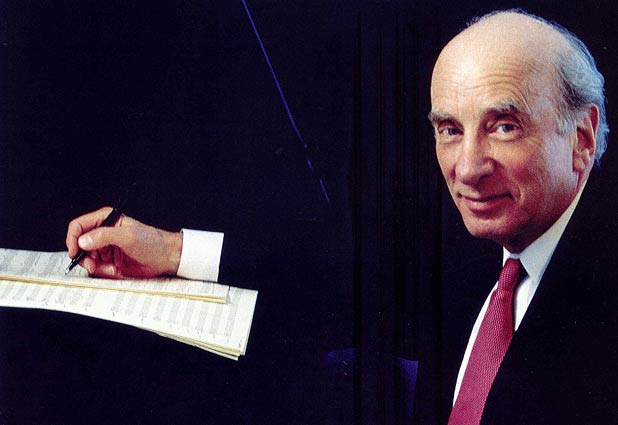
Dick Hyman. Photo courtesy of the artist.
Dick Hymn has been a guest on Riverwalk Jazz so often we often think of him as the eighth member of The Jim Cullum Jazz Band. On this edition of Riverwalk Jazz, host David Holt talks with Dick about his life in music, and we hear a sample of the wide variety of music he’s performed, arranged and recorded over the years.
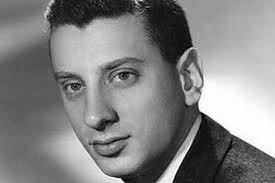
Young Dick Hyman. Photo courtesy of the artist.
Mr. Hyman is a man of many sounds. His unmistakably light touch on the ivories has earned him nicknames like “the Fred Astaire of the keyboard.” Dick is often in demand as the pianist able to represent every style in American music—from Eubie Blake to the present day—with precise historical accuracy. Dick accomplishes this with a delight in the music that makes even the most obscure repertoire fascinating. It’s important to point out that even though Hyman has studied and incorporated elements of earlier jazz styles, his playing is a highly original synthesis that is uniquely his own.
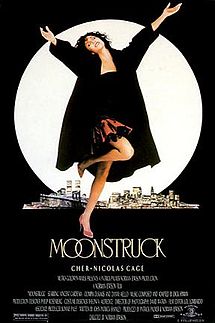
Moonstruck movie poster. Image courtesy Wikimedia.
Dick’s biography reads like a guidebook to American pop culture. He toured Europe with Benny Goodman; composed the score for the Academy Award-winning motion picture Moonstruck; was Music Director for Arthur Godfrey’s TV show; and often provides the music for Woody Allen movies such as Radio Days, Zelig, and Sweet and Lowdown. Dick Hyman has written musical arrangements for the Boston Pops and opera diva Jessye Norman. He’s composed ballet scores for Twyla Tharpe. He’s the author of a dozen books, and he’s made hundreds of recordings under his own name and hundreds more under names like “Knuckles O’Toole” or “Martin Munchausen and the Polka Barons.” To say that Dick Hyman has eclectic taste is a classic understatement.
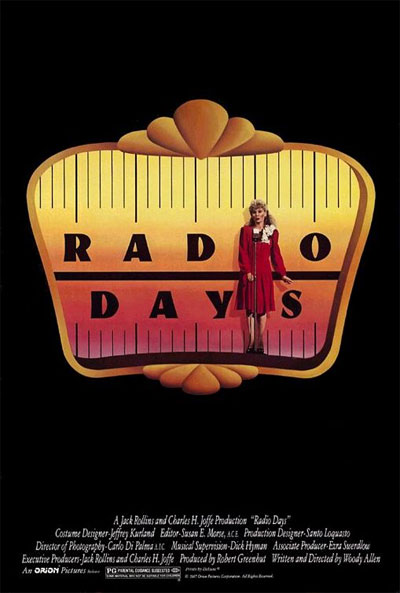
Radio Days movie poster. Image courtesy Wikimedia.
Dick Hyman was born in New York City in 1927 and grew up in nearby Mt. Vernon. He began to play the piano when he was very young. He also began to play the clarinet. Dick’s early music education came from listening to the radio and from jazz records his brother brought home. Dick first started to get paid to play the piano when he was in high school, but his first big break came while he was in college at Columbia University. He entered a jazz piano contest sponsored by a local radio station. Not surprisingly, Dick won first place. What is surprising is the prize he won: twelve free lessons with the great Swing Era pianist Teddy Wilson. About those lessons Dick says:
“Teddy Wilson was a great influence. I learned a lot of chord substitutions, runs, general approaches to standard tunes, and just generally how to be a solo pianist.“ As far as learning the jazz repertoire, Hyman says, “The tunes that stayed with me as great vehicles for jazz playing are most often by Gershwin, Rodgers and Porter. But really, I made it my business to learn as many pop and show tunes as I possibly could.”
Host David Holt asks Dick about his practice habits:

Chopin Etude. Image courtesy Wikimedia.
“I practice as needed, and mostly I need to. I get in some time pretty much every day.” In addition to the usual scales, arpeggios and technical studies, Dick talks about the importance of the Chopin Etudes to his playing. “Chopin really knew a thing or two about the piano, and if you really work on those things it helps any kind of playing.”
.jpg)
Dick Hyman. Photo courtesy of the artist.
Over two decades of playing together on the Riverwalk Jazz radio series, Dick Hyman and Cullum Band pianist John Sheridan have performed many two-piano, four-handed duets on music by Fats Waller, James P. Johnson and George Gershwin in styles ranging from Rags to Boogie Woogie, Stride and Swing. Dick explains that thought some of the duets are written out, for the most part the two pianists prefer to “cut each other a lot of slack” and leave plenty of room for improvisation. As an example, for this radio show Hyman and Sheridan play a version of Gershwin’s “Sweet and Lowdown” that starts off with the exact piano part by Gershwin, and then modulates to several rousing improvised choruses incorporating Boogie Woogie and Stride elements.
Boogie Woogie blues piano from the interwar years is another genre explored on by the Hyman/Sheridan “dynamic duo.” This radio show features two selections from Meade Lux Lewis, “Celestial Express” which Dick plays on the unusual bell-like celeste, and a duo on the rousing “Honky Tonk Train.”
Quite apart from his roles “out front” as bandleader, composer, conductor and soloist, Dick Hyman is also one of the world’s great accompanists, especially for singers. Stephanie Nakasian, an East Coast jazz singer and educator, joins Dick and the rhythm section for Hoagy Carmichael’s “Skylark.”
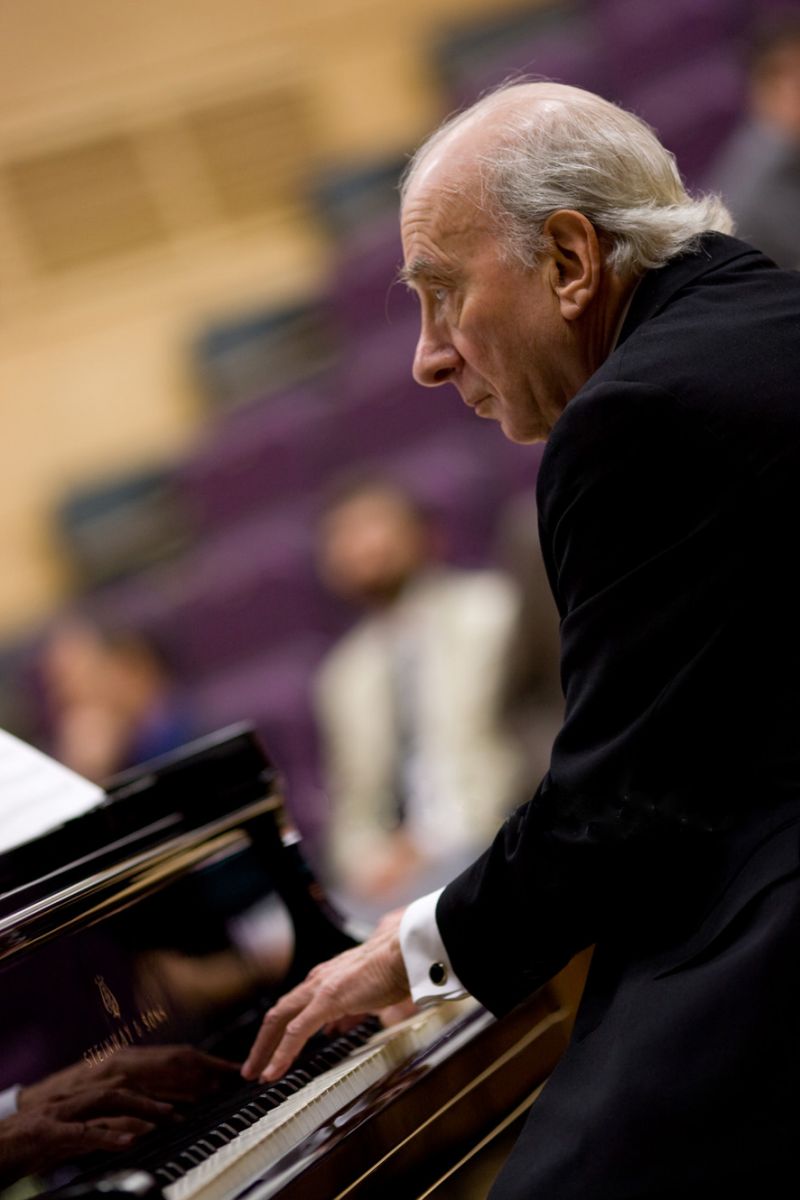
Dick Hyman. Photo courtesy of the artist.
Dick Hyman has held down just about every job available to a keyboardist in the music business. In the 1950s after he graduated from college many such jobs were available that simply don’t exist anymore. For instance, Dick was the house pianist at the jazz club Birdland, and he played with society bandleader Lester Lanin. He was staff pianist at NBC and staff organist on TV soap operas and quiz shows like “Beat the Clock” and Monty Hall’s “The Sky’s the Limit.”
When asked how he finds something to love about so many different kinds of music, Dick says, “They’re all interesting in one way or another. Some of them are demanding and challenging, some of them are just wonderful to be associated with, and some of them are funny, and you kind of do that laughing to yourself.” As to which of his jobs was the most challenging, he responds, “some of the scores I’ve composed, orchestrated and conducted for films. They require just about everything I know.” Also, “working with another pianist is a wonderful way of getting to know somebody else. When I work with John Sheridan, I feel we are on the same wavelength and we both think exactly the same.” Hyman also notes a duo concert he played with George Shearing. “That was pretty sublime because Shearing is a marvelous beacon in my pianistic life; he does it beautifully.”
For our show, Hyman gives full range to his fecund imagination with a spectacular solo on George Gershwin’s “A Foggy Day in London Town,” using all the considerable pianistic and harmonic resources at his disposal, at times reminiscent of his jazz mentors Teddy Wilson and Art Tatum, but mostly of his own invention.

Woody Allen. Photo courtesy Wikimedia.
One of Dick’s many musical interests is the classic jazz of the 1920s. For the Riverwalk Jazz radio series Dick has performed works by James P. Johnson, Jelly Roll Morton, King Oliver, Louis Armstrong, Earl Hines and Fats Waller. Here, he joins the band on Jelly Roll Morton’s great hot piece, “Black Bottom Stomp,” and the superb Fats Waller stride pieces “Minor Drag” and “Jitterbug Waltz.”
Describing the process of working with Woody Allen, Hyman says, “sometimes it begins with just a telephone call, a general conference about what Woody feels would be appropriate. At other times it might be, ‘you really ought to see this scene, see what we’re trying to do.’ Writing music for films is not a solitary thing, you have to be working with other people, particularly the writer, director, editor and producer.” Dick describes how on some films Woody installed a small piano in the editing room, and “I improvised along with the film for a while to get some ideas that we both could examine together.” Our show this week features Hyman singing the hilarious original tune he wrote (music and lyrics) for the 1983 Woody Allen film Zelig, called “Doin’ the Chameleon.”
.jpg)
John Sheridan and Dick Hyman. Photo courtesy of Riverwalk Jazz.
Our radio concert and interview concludes with Dick Hyman joining forces with John Sheridan and the full The Jim Cullum Jazz Band on Fats Waller’s 1929 masterpiece “Handful of Keys.”
Photo credit for Home Page. Dick Hyman at Pearl Stable. Photo by Jamie Karutz, courtesy Riverwalk Jazz.
Text based on Riverwalk Jazz script by Margaret Moos Pick © 2000

